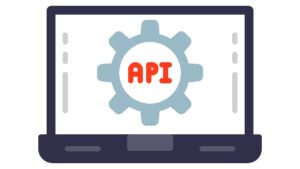In the fast-paced digital world, Application Programming Interface APIs have emerged as the unsung heroes behind our seamless digital experiences. But what is an API, and why are they so important? In this article, we’ll simplify the world of APIs, explore their transformative power in enabling seamless communication between applications and driving digital transformation. Stay with us as we explore the characteristics, benefits, and critical role of APIs in enhancing customer experiences, accelerating business growth, and unlocking new opportunities.

What exactly is an API and how does it Work?
Bridging the Gap Between Applications
APIs, or application programming interfaces, serve as the vital link that facilitates communication between different software applications. They act as software intermediaries, enabling two applications to interact and exchange data seamlessly. From ride-sharing apps to mobile payments and even adjusting thermostat settings from your phone, APIs are omnipresent in our daily lives. When you use these applications, they connect to the internet, send data to a server, which interprets and performs the necessary actions, and then sends the results back to your device in a user-friendly format.
The Characteristics of Modern APIs
Developer-Friendly and Easily Accessible
In recent years, APIs have undergone a remarkable transformation, gaining unique characteristics that have revolutionized the technology landscape. Modern APIs adhere to specific standards, typically HTTP and REST, making them developer-friendly, self-described, and easily accessible. Developers can integrate APIs into their applications seamlessly, reducing complexity and accelerating development processes.
Application Programming Interface APIs as Products
Gone are the days when APIs were seen solely as lines of code. Today, Application Programming Interface APIs are treated as products in their own right. They are designed for consumption by specific audiences, such as mobile developers, and undergo meticulous documentation and versioning. This approach ensures that users have clear expectations regarding the maintenance, lifecycle, and functionality of the APIs they integrate into their applications.

Standardization, Security, and Governance
Modern APIs prioritize standardization, enabling effective monitoring and management of performance and scale. Moreover, APIs place a strong emphasis on security and governance. They ensure that data transmission occurs in small, controlled packets, limiting exposure and safeguarding sensitive information. This level of control and security is akin to the process of ordering takeout at a restaurant, where only necessary information is shared, and privacy is maintained.
The API Economy and Revenue Generation
APIs as Revenue Drivers
In today’s digital landscape, Application Programming Interface APIs have become valuable assets that contribute significantly to businesses’ revenue streams. On average, 35% of organizations’ revenue is generated through APIs and related implementations. Companies are recognizing the potential of APIs to create new revenue opportunities, innovate their offerings, and tap into the vast marketplace of APIs known as the API economy.
APIs Driving Digital Transformation
The Role of APIs in Digital Transformation
To stay competitive and meet evolving customer demands, companies are undergoing digital transformation at an unprecedented pace. APIs play a pivotal role in enabling this transformation. In fact, 90% of executives consider APIs to be mission-critical to their businesses. By adopting API-driven strategies, organizations can simplify and accelerate their go-to-market strategies, enhance customer experiences, improve operational agility and speed, and explore new revenue, market, and channel opportunities.
Embrace the Power of APIs: Establishing an Effective API Strategy
Enhancing the Customer Experience and Driving Innovation
To thrive in the digital era, businesses must embrace the power of APIs and establish an effective API strategy. By leveraging APIs, companies can unlock unparalleled levels of innovation and connectivity. APIs enable businesses to enhance the customer experience, streamline operations, and explore new avenues for growth and revenue generation.
Whitepaper: API Strategy Essentials
To delve deeper into establishing an API strategy that enhances the customer experience and transforms your business, read whitepaper on API strategy essentials. Discover the key considerations, best practices, and real-world examples that will empower you to harness the true potential of APIs.
Conclusion
In this digital age, Application Programming Interface APIs serve as the invisible threads weaving together our interconnected world. From powering everyday applications to driving revenue and enabling digital transformation, APIs have become indispensable. By understanding the characteristics, benefits, and importance of APIs, businesses can unlock new growth opportunities and embrace the power of seamless connectivity. Embrace APIs as the catalysts for innovation, customer-centricity, and success in the digital realm.
FAQ:
Q1: What is the role of APIs in digital transformation?
A1: APIs play a crucial role in digital transformation by enabling seamless connectivity, enhancing customer experiences, improving operational agility, and unlocking new revenue opportunities.
Q2: How are modern APIs different from traditional APIs?
A2: Modern APIs adhere to specific standards, are developer-friendly, and treated as products. They prioritize standardization, security, and governance, making them more accessible and secure.
Q3: Can APIs generate revenue for businesses?
A3: Absolutely! APIs have become revenue drivers for many organizations. On average, 35% of companies’ revenue is generated through APIs and related implementations.
Q4: How can businesses establish an effective API strategy
A4: Businesses can establish an effective API strategy by identifying their goals, understanding their target audience, documenting and versioning their APIs, and embracing API-driven innovation and connectivity.
Q5: Where can I learn more about API strategy essentials?
A5: To delve deeper into API strategy essentials, we recommend reading API Strategy essentials whitepaper on the topic. It covers key considerations, best practices, and real-world examples to help you unlock the true potential of APIs in your business.


Hi there
Just checked your currentscroll.com baclink profile, I noticed a moderate percentage of toxic links pointing to your website
We will investigate each link for its toxicity and perform a professional clean up for you free of charge.
Start recovering your ranks today:
https://www.hilkom-digital.de/professional-linksprofile-clean-up-service/
Regards
Mike Alsopp
Hilkom Digital SEO Experts
https://www.hilkom-digital.de/
Hello
I have just checked currentscroll.com for the ranking keywords and saw that your website could use an upgrade.
We will improve your ranks organically and safely, using only state of the art AI and whitehat methods, while providing monthly reports and outstanding support.
More info:
https://www.digital-x-press.com/unbeatable-seo/
Regards
Mike Hancock
Digital X SEO Experts
Hi there,
My name is Mike from Monkey Digital,
Allow me to present to you a lifetime revenue opportunity of 35%
That’s right, you can earn 35% of every order made by your affiliate for life.
Simply register with us, generate your affiliate links, and incorporate them on your website, and you are done. It takes only 5 minutes to set up everything, and the payouts are sent each month.
Click here to enroll with us today:
https://www.monkeydigital.org/affiliate-dashboard/
Think about it,
Every website owner requires the use of search engine optimization (SEO) for their website. This endeavor holds significant potential for both parties involved.
Thanks and regards
Mike Ford
Monkey Digital